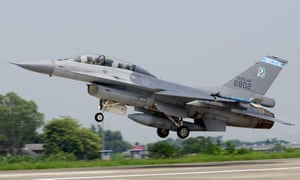Decision removes 150 planes from service, leaving the island with a limited fleet amid increased flyovers by Chinese forces

Taiwan has grounded all of its F16 fighter jets for safety checks as rescuers continue to search for one that went missing during a training exercise. Photograph: Sam Yeh/AFP/Getty Images
Taiwan has grounded all its F16 fighter jets for safety checks as rescuers continue to search for one that went missing during a training exercise, authorities said Wednesday.
The decision removes around 150 planes from Taiwan’s skies, leaving the democratic island relying on a more limited fleet to warn off Chinese jets that have been performing flyovers at an unprecedented rate in recent months.
The air force said a single-seat F16 flown by a 44-year-old pilot disappeared from radar at an altitude of 6,000ft (1,800 metres) two minutes after taking off from Hualien air base in eastern Taiwan on Tuesday night.
“The rescue mission is our top priority now. The air force has grounded all F16s for checks and I’ve instructed an investigation into the cause of the incident,” President Tsai Ing-wen told reporters.
Taiwan lives under the constant threat of invasion by China, which views the island as its own territory and has vowed to seize it one day, by force if necessary.
Its fleet of fighters is old and outgunned by China’s. Without the F16s, it consists of the locally built Indigenous Defence Fighter, French-built Mirages from the late 1990s and F5-E fighters that date back to the 1970s.
Taiwan has scrambled its planes at double the rate of last year to protect against China’s increased incursions into its defensive zone.
Analysts say Beijing’s fly-bys are designed to test the island’s defence responses but also to wear out its fighters, which come closer to expiry with each sortie.
Taiwan’s military has been battered by a string of air crashes this year.
In January, eight senior officials including the chief of the general staff were killed in a helicopter crash.
Beijing has piled military, economic and diplomatic pressure on Taiwan since President Tsai’s election in 2016, in part due to her refusal to acknowledge its stance that the island is part of “one China”.
Under US President Donald Trump, Washington authorised some $18bn worth of arms sales to Taiwan, including 66 new generation F16s and advanced missile platforms – sales that have angered Beijing.
